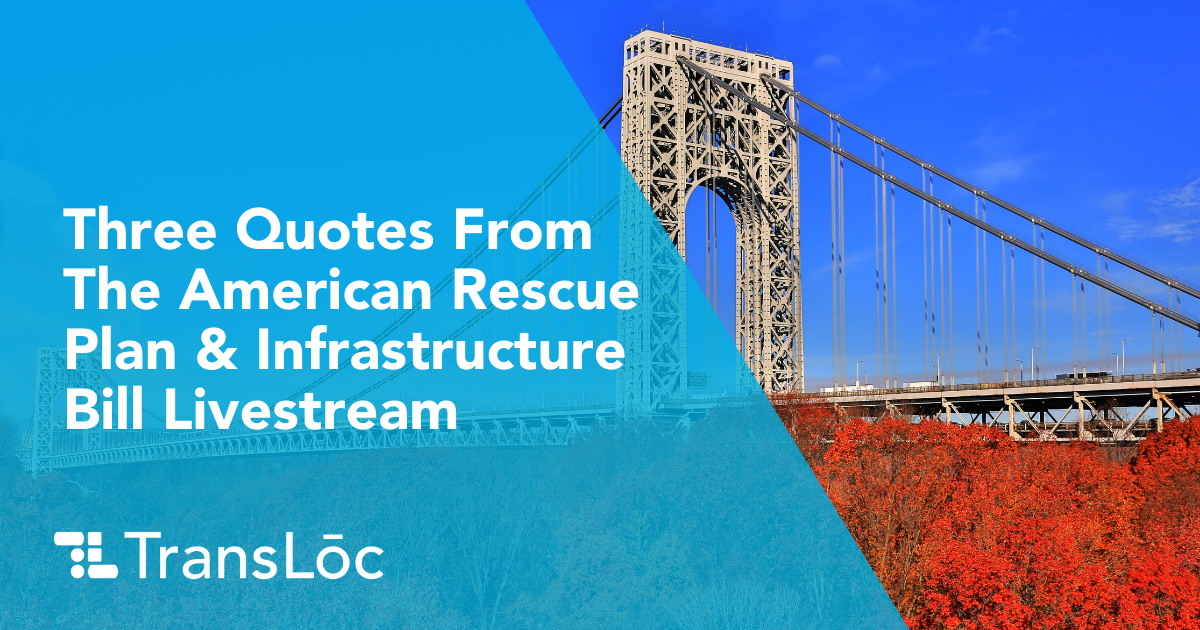
The $1.2 trillion bipartisan infrastructure bill could be the watershed moment of the 21st century for public transit operators and riders. With $39 billion dedicated to expanding transportation systems, encouraging adoption of zero- and low-emission vehicles, and improving service accessibility, the U.S. can reinvent how public transportation is used by communities of all sizes.
On the day the bill was signed into law, we hosted a virtual chat with the American Public Transportation Association’s Art Guzzetti, the Association for Commuter Transportation’s David Straus, and Ford Mobility & City Solutions* Ryan Westrom, for their thoughts on the short- and long-term impact this influx of cash will have on transportation services in the U.S.
Here are three quotes that have us talking:
“Transit is the great social equalizer. It can evenhandedly provide access to jobs, to healthcare, to education, and to opportunity.”
– Art Guzzetti, Vice President of Mobility Initiatives & Policy for the American Public Transportation Association [14:20]
Decades of car-friendly urban planning decisions, shrinking budgets, and land management policies have splintered neighborhoods — particularly low-income and minority communities — from core business hubs and critical healthcare services. Generations of families have been impacted by these choices, but now is the opportunity to bring positive change to the lives of multiple generations and establish universal basic mobility. Investing in new mobility solutions that address some of the largest barriers for low-income riders — e.g., transit deserts or fare affordability — will be the link to nutritious food, quality education, and preventive healthcare that many have been denied.
“Such change is possible … but our default is usually to try and move forward with the quick and the same. It’s going to require a new way of thinking, new way of planning, and a new way of coordinating within local communities to make sure we’re delivering products and services that actually meet [their] needs.”
– David Straus, Executive Director for the Association for Commuter Transportation [18:50]
Multimodal mobility solutions powered by flexible technology are helping transit providers rethink community transportation. The synergy of traditional fixed-route buses, on-demand shuttles, and e-scooters and e-bikes is solving the first-mile/last-mile conundrum, improving accessibility, and allowing for data-driven service growth. Creative investment into optimizing these solutions will pull communities out of the mobility monoculture, and into a new mobility ecosystem where riders have the freedom of choice to go where they need to go.
“We’re at an inflection point in terms of building-in technology for the environment.”
– Ryan Westrom, Head of Mobility Engagement for Ford Mobility & City Solutions [22:04]
Countries across the globe are focused on climate change, carbon emissions, and sustainability practices. Electrific and autonomous vehicles often dominate the headlines when talking about public transit’s sustainable future. There’s no denying they play a key role in turning transit green, but they are not enough. Transit providers need access to smart technology and modern simulation software to make decisions about how their fleets and services operate. Using real-time microtransit data can show transit providers the best location for a new on-demand service zone or the times of day when a single on-demand vehicle can efficiently serve a neighborhood. Fleets that work smarter, not harder, can cut down on roadway congestion, fuel waste, and vehicle wear and tear.
To keep the conversation going, watch the entire panel discussion and then schedule a chat with us to share ideas on your vision to reshape your transit ecosystem.
*On March 1, 2022, global technology company Modaxo acquired TransLoc from Ford Motor Company. TransLoc is no longer affiliated with Ford or any Ford properties.